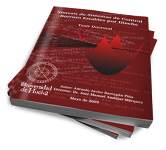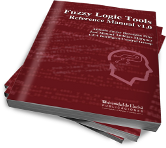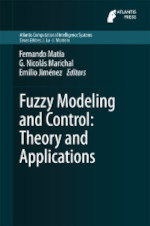Inicie su sesión para modificar los apuntes, usar los foros, etc. Si no es usuario de la web, regístrese.
Fuzzy Logic Tools
Fuzzy Logic Tools
18 April, 2011 - 18:00 — Javier BarragánFuzzy Logic Tools (FLT) is a C++ framework for storage, analysis and design of fully general multiple-input multiple-output (MIMO) Takagi-Sugeno fuzzy systems, without constraints in the order of either the inputs or the output vectors. This sofware is based on my doctoral thesis (spanish).
FLT has been written in C++. This software has been compiled and tested on GNU/Linux using GCC, and on Microsoft Windows© operating systems using MinGW, both on 32 and 64 bits architectures.
FLT is source code, so you do not need to be installed. If you wish, you can copy the directory "flt" to a route included in the search path of your compiler, for example, "/usr/include" in GNU/Linux or "C:\MinGW\include" if you use MinGW in Microsoft Windows©.
FLT can be used to make MATLAB© function via MATLAB© API. We recommend that you use GNUMex with Mingw to compile the MEX files in Microsoft Windows© enviroments. Some MATLAB aplications are in the "matlab_utilities" folder. These applications are MEX files that use Fuzzy Logic Tools.
Authors:
- Dr. Antonio Javier Barragán Piña, antonio.barragan _at_ diesia.uhu.es
- Dr. José Manuel Andújar Márquez, andujar _at_ diesia.uhu.es
Department of Electronic Engineering, Computer Systems and Automation, University of Huelva (Spain).
Special thanks to José Manuel Martín Ramos for his continued support.
---
Download, Help and Bugs reports:
- You can download the latest versions of the FLT and access to forums and bugs tracking system on sourceforge.net.
Documentation:
-
FLT is documented by doxygen. You can consult the online version of this documentation or download the PDF version
 .
. -
Fuzzy Logic Tools Reference Manual is also available in Google Books and
 .
.
---
Fuzzy Logic Tools uses GNU Scientific Library (GSL) and Template Numerical Toolkit (TNT).
For more information, please contact with authors.
Copyright (c) 2004-2013
This software is free software: you can redistribute it and/or modify it under the terms of the GNU General Public License as published by the Free Software Foundation, either version 3 of the License, or (at your option) any later version.
- Inicie sesión para enviar comentarios
- Spanish
Fuzzy Logic Tools
17 December, 2012 - 17:27 — Javier BarragánFuzzy Logic Tools (FLT) es un entorno completamente general para el almacenamiento, análisis y diseño de sistemas borrosos Takagi-Sugeno múltiple entrada- múltiples salida (MIMO), sin restricciones en el orden de los vectores de entrada o salida. Este software está basado en el trabajo realizado en mi Tesis doctoral.
FLT ha sido escrito en C++. Este software ha sido compilado y probado en GNU/Linux utilizando GCC, y en en Microsoft Windows© mediante MinGW, tanto en arquitecturas de 32 como de 64 bits.
FLT se distribuye como código fuente, de forma que no requiere ser instalado. Si lo desea puede copiar el directorio "flt" a una ruta incluida en los directorios de búsqueda de su compilador, por ejemplo, "/usr/include" en GNU/Linux o "C:\MinGW\include" si utiliza MinGW en Microsoft Windows©.
FLT puede ser utilizado para implementar funciones de MATLAB© a través de su API (archivos MEX). Nosotros recomendamos la utilización de GNUMex con Mingw para compilar estos archivos en entornos Microsoft Windows©. En la carpeta "matlab_utilities" de FLT se distribuyen algunas aplicaciones de MATLAB©. Estas aplicaciones son archivos MEX que utilizan la Fuzzy Logic Tools.
Autores:
- Dr. Antonio Javier Barragán Piña, antonio.barragan _at_ diesia.uhu.es
- Dr. José Manuel Andújar Márquez, andujar _at_ diesia.uhu.es
Departmento de Ingeniería Electrónica, de Sistemas Informáticos y Automática, Universidad de Huelva (España).
Se desea agradecer especialmente a José Manuel Martín Ramos su continua ayuda en la realización de este proyecto.
---
Descarga, Ayuda y Reporte de errores:
- Puede descargar la última versión de FLT, y acceder a foros y al registro de errores en sourceforge.net.
Documentación:
-
FLT está documentado mediante doxygen. Puede consultar la versión en línea de esta documentación, o descargar la versión PDF
 .
. -
El manual de FLT, Fuzzy Logic Tools Reference Manual, también está disponible de forma gratuita en Google Books y
 .
.
---
Fuzzy Logic Tools utiliza GNU Scientific Library (GSL) y Template Numerical Toolkit (TNT).
Para más información, por favor, contacte con los autores.
Copyright (c) 2004-2013
Este software es software libre: usted puede redistribuirlo y/o modificarlo bajo los términos de la GNU General Public License (GPL) tal com es publicada por la Free Software Foundation, en su versión 3 o, (a su elección) en cualquier versión posterior.
- Inicie sesión para enviar comentarios
- English
My doctoral thesis: "Synthesis of stable fuzzy control systems by design"
15 March, 2011 - 18:08 — Javier BarragánTitle: Synthesis of stable fuzzy control systems by design. (this text is written in spanish)
Autor: Antonio Javier Barragán Piña.
Director: Dr. José Manuel Andújar Márquez.
Defense date: July 7, 2009.
Thesis tribunal:
President: Pedro Albertos Pérez, C.U., Polytechnic University of Valencia.
Secretary: Francisco Gordillo Álvarez, C.U., University of Seville.
1st Vocal: Sebastián Dormido Bencomo, C.U., U.N.E.D.
2nd Vocal: Agustín Jiménez Avello, C.U., Polytechnic University of Madrid.
3rd Vocal: Patricio Salmerón Revuleta, C.U., University of Huelva.
Qualification: Cum Laude with honors.
Awards:
PhD Extraordinary Award of the University of Huelva 2009/2010.
Best Thesis prize 2009-2011 awarded by Intelligent Control Intelligent Control group of CEA/IFAC.
Abstract: The principal objective of this Thesis was to establish a design methodology for fuzzy controllers as general as possible, so as to ensure the asymptotic stability of the closed loop control system. Similarly, we wanted to contribute to the formalization of fuzzy systems with tools that allow analysis of these systems according to the nonlinear control theory accepted by the scientific community.
My Thesis provided a comprehensive methodology for modeling, analysis and synthesis of fuzzy control systems, innovative in many respects, and whose development is discussed step by step throughout the memory. In each chapter provided both the structure of the software and algorithms necessary for practical implementation.
I.S.B.N.: 978-84-92944-72-9
Legal Deposit: H 34-2010
License:
This work is licensed under a Creative Commons Attribution-ShareAlike 3.0 License, approved for Free Cultural Works initiative.
All code in this work is licensed under the license GNU/GPLv3.
Download (please keep in mind the licensing terms outlined in the previous section):
You can purchase a print version in Lulu or Bubok. (This work is written in spanish)
View online at Google Books (spanish).
Download from Google Play (free, spanish).
LaTeX, C/C++ and MATLAB sources.
Download in PDF format (spanish).
An updated version of the source code of the algorithms developed in this thesis can be downloaded from the fuzzylogictools (FLT) project in Sourceforge.
- Inicie sesión para enviar comentarios
- Spanish






